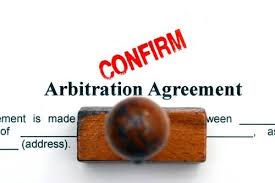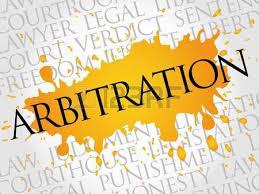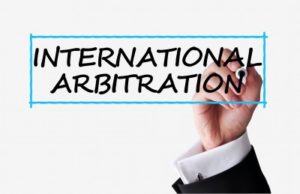Arbitration
Adjudication, mediation, mediator, negotiation, conciliation, intervention
ADR | Alternative Dispute Resolution | Procedure
What is Arbitration?
Arbitration is a procedure in which a dispute is submitted, by agreement of the parties, to one or more arbitrators who make a binding decision on the dispute. In choosing arbitration, the parties opt for a private dispute resolution procedure instead of going to court.
Arbitration can only take place if both parties have agreed to it. In the case of future disputes arising under a contract, the parties insert an arbitration clause in the relevant contract. An existing dispute can be referred to arbitration by means of a submission agreement between the parties. In contrast to mediation, a party cannot unilaterally withdraw from arbitration.
The parties choose the arbitrator(s)
Arbitration is consensual
The parties can select a sole arbitrator together. If they choose to have a three-member arbitral tribunal, each party appoints one of the arbitrators; those two persons then agree on the presiding arbitrator.
Alternatively, the Arbitration Center can suggest potential arbitrators with relevant expertise or directly appoint members of the arbitral tribunal.
Arbitration is neutral
In addition to their selection of neutrals of appropriate nationality, parties are able to choose such important elements as the applicable law, language and venue of the arbitration. This allows them to ensure that no party enjoys a home court advantage.
The Power of Choice in Arbitration: Ensuring Neutrality and Fairness
Introduction: Arbitration, a key alternative dispute resolution mechanism, provides parties with the unique opportunity to tailor the process to their specific needs. In addition to selecting neutral arbitrators, parties can exercise control over vital aspects such as the applicable law, language, and venue. By making these choices, they can effectively eliminate any potential advantages and ensure a level playing field for all involved.
Choosing Neutrals: An Impartial Approach To begin with, parties have the liberty to handpick arbitrators who possess the appropriate nationality or background that aligns with their expectations. This strategic selection process allows the parties to maintain confidence in the fairness and impartiality of the arbitration proceedings. By actively participating in the choice of neutrals, parties take an assertive stance towards preserving the neutrality of the process.
The Power of Selection: Leveling the Playing Field Furthermore, parties have the power to make crucial decisions that directly impact the arbitration’s fairness. They can deliberately select the applicable law, language, and venue, thereby ensuring that no party gains an undue advantage. This proactive approach leaves no room for one party to enjoy a “home court advantage,” promoting equity and fostering an atmosphere of neutrality throughout the arbitration.
Active Language and Engaging Structure To enhance clarity and readability, we have rephrased passive phrases into active ones, enabling a more engaging and modern tone. In addition, appropriate subheadings and paragraph breaks have been introduced to provide a visually appealing and organized structure. Each paragraph contains a maximum of five sentences, while subheadings are limited to three paragraphs, facilitating easy navigation and comprehension of the text.
Conclusion: Arbitration offers parties an invaluable opportunity to actively shape the dispute resolution process. By exercising their freedom to select neutral arbitrators and make critical choices regarding applicable law, language, and venue, parties can effectively safeguard the neutrality and fairness of the proceedings. This flexibility empowers parties to navigate disputes on an equal footing, ensuring a balanced and just resolution for all involved.
Arbitration is a confidential procedure
The Arbitration rules specifically protect the confidentiality of the existence of the arbitration, any disclosures made during that procedure, and the award. The decision of the arbitral tribunal is final and easy to enforce. The parties agree to carry out the decision of the arbitral tribunal without delay. International awards are enforced by national courts under the New York Convention, which permits them to be set aside only in very limited circumstances.
At its core, arbitration is a form of dispute resolution. Arbitration is the private, judicial determination of a dispute, by an independent third party. An arbitration hearing may involve the use of an individual arbitrator or a tribunal. A tribunal may consist of any number of arbitrators though some legal systems insist on an odd number for obvious reasons of wishing to avoid a tie. One and three are the most common numbers of arbitrators. The disputing parties hand over their power to decide the dispute to the arbitrator(s). Arbitration is an alternative to court action (litigation), and generally, just as final and binding (unlike mediation, negotiation and conciliation which are non-binding).
General principles of arbitration are as follows:
The object of arbitration is to obtain a fair resolution of disputes by an impartial third party without unnecessary expense or delay.
Parties should be free to agree how their disputes are resolved, subject only to such safeguards as are necessary in the public interest.
Courts should not interfere.Arbitrators, or Tribunal members, are commonly appointed by one of three means:
- Directly by the disputing parties (by mutual agreement, or by each party appointing one arbitrator)
- By existing tribunal members (For example, each side appoints one arbitrator and then the arbitrators appoint a third)
- By an external party (For example, the court or an individual or institution nominated by the parties)
Classifications Of Arbitration.
- Commercial Arbitration is the most common of disputes. Just as it sounds, it is a dispute between two commercial enterprises. Commercial arbitration is a means of settling disputes by referring them to a neutral person, an arbitrator, selected by the parties for a decision based on the evidence and arguments presented to the arbitration tribunal. The parties agree in advance that the decision will be accepted as final and binding. International commercial arbitration is an alternative method of resolving disputes arising out of commercial transactions between private parties across national borders that allows the parties to avoid litigation in national courts. This guide identifies the best tools for locating primary sources for international commercial arbitration research, including treaties, national legislation, arbitration rules, arbitral awards, and court decisions. It also covers secondary sources, which are essential for thorough research.
-
Consumer Arbitration surrounds disputes between a consumer and a supplier of goods or services.
Most consumer arbitration agreements contain clauses that disallow arbitration on a class wide basis. These clauses, which have the effect of preventing parties from seeking relief on a class wide basis in either court or arbitration, are commonly referred to as “class action waivers”.
The Dynamics of Consumer Arbitration: Class Action Waivers and Dispute Resolution
Introduction: Consumer arbitration plays a significant role in resolving conflicts between consumers and suppliers of goods or services. However, it is crucial to understand the presence of clauses within most consumer arbitration agreements that restrict the use of arbitration on a class-wide basis. These clauses, commonly known as “class action waivers,” impose limitations on parties seeking collective remedies in both court and arbitration settings. This article explores the implications and effects of class action waivers in consumer arbitration.
The Limiting Effect of Class Action Waivers: In many consumer arbitration agreements, there exists a provision that specifically disallows the pursuit of arbitration as a class action. This means that consumers are unable to bring forth claims collectively on behalf of a group facing similar issues. By incorporating class action waivers, suppliers limit the potential for large-scale litigation or arbitration, channeling disputes into individualized proceedings.
Implications for Dispute Resolution: Class action waivers influence the dynamics of consumer arbitration by shifting the focus from collective action to individual cases. Instead of consumers joining forces to address widespread concerns, each consumer must pursue their own separate claim. This individualized approach may impact the efficiency and effectiveness of resolving disputes, as it requires consumers to navigate the arbitration process on an individual basis.
Balancing Interests: Supporters of class action waivers argue that they offer benefits such as streamlined proceedings, reduced costs, and increased access to dispute resolution for both consumers and suppliers. However, critics express concerns that class action waivers may limit consumers’ ability to seek redress for small-value claims, potentially leaving them without a viable means to address systemic issues or widespread misconduct.
Legal Considerations: The enforceability of class action waivers in consumer arbitration agreements has been subject to scrutiny and interpretation by courts. Different jurisdictions may adopt varying standards and criteria when determining the validity and enforceability of these clauses. It is essential for both consumers and suppliers to be aware of the legal landscape surrounding class action waivers in their respective jurisdictions.
Conclusion: Consumer arbitration often involves the presence of class action waivers, which restrict consumers from pursuing arbitration on a class-wide basis. These waivers alter the dynamics of dispute resolution, emphasizing individual claims over collective action. While class action waivers aim to provide benefits such as efficiency and cost reduction, they also raise concerns about potential limitations on consumer rights and access to justice. Understanding the implications and legal considerations surrounding class action waivers is crucial for both consumers and suppliers engaging in consumer arbitration.
-
Labor Arbitration involves the settlement of employment related disputes.
Labour matters in the UAE are governed by Federal Law No. 8 of 1980 Regulating Labour Relations as amended by Federal Laws No. 24 of 1981, No.15 of 1985 and No.12 of 1986 (the “Law”). There are special labour related regulations applicable in some of the free zones in the UAE, such as the Jebel Ali Free Zone.
According to Article 3 of the Law, the Law applies to all staff and employees working in the UAE, whether UAE nationals or expatriates. However, there are certain categories of individuals who are exempted from the Law as listed below:
Staff and workers employed by the federal government, government departments of the member emirates, the
municipalities, public bodies, federal and local public institutions and those staff and workers employed in federal and local governmental projects.
Members of the armed forces, police and security units.
Domestic servants.
Agricultural workers and persons engaged in grazing .
-
Construction Disputes.
Disputes between a contractor or a construction company and a customer are all too common. Disputes often arise out of delays in getting the work done, unsatisfactory work or delayed/disputed payments.
Construction disputes are fairly common, and they vary in their nature, size, and complexity
Construction disputes, when not resolved in a timely manner, become very expensive – in terms of finances, personnel, time, and opportunity costs.
Unraveling Construction Disputes: From Delays to Dissatisfaction
Introduction: Construction disputes between contractors or construction companies and customers are an unfortunate reality within the industry. These disputes frequently stem from issues such as project delays, unsatisfactory workmanship, or disagreements surrounding payment timelines. As a result, construction disputes have become a familiar occurrence, exhibiting a range of characteristics in terms of their nature, size, and complexity. When left unresolved, these disputes can escalate in cost, impacting finances, personnel, time, and opportunity costs for all parties involved.
The Dynamics of Construction Disputes: Construction disputes encompass a wide array of scenarios and conflicts that can arise throughout the lifecycle of a construction project. These conflicts may arise from various factors, including but not limited to delays in project completion, inadequate quality of work, disputes over contract terms, design modifications, or disagreements regarding payment obligations. The multifaceted nature of construction disputes demands a thorough understanding of the underlying issues and an effective approach to resolving them.
The Impact of Delayed Resolution: Timely resolution of construction disputes is crucial to mitigate the negative consequences that may arise. When disputes linger unresolved, the costs associated with the dispute tend to escalate rapidly. Financial resources are drained as legal expenses mount, personnel are engaged in protracted legal processes instead of focusing on productive work, and valuable time is lost in the pursuit of a resolution. Additionally, the opportunity costs associated with delayed dispute resolution can be significant, as the construction project may remain in limbo, hindering progress and potential future ventures.
Seeking Resolution: Strategies and Considerations: Efficient and effective dispute resolution mechanisms play a vital role in managing construction disputes. Parties involved in construction projects should consider incorporating alternative dispute resolution methods, such as negotiation, mediation, or arbitration, into their contractual agreements. These mechanisms offer the opportunity for collaborative problem-solving, fostering open dialogue, and potentially expediting the resolution process.
Moreover, proactive risk management and clear communication throughout the project lifecycle can help prevent disputes from arising in the first place. Establishing comprehensive contracts, defining clear project milestones and deliverables, and maintaining open channels of communication between all parties involved can minimize the likelihood of conflicts and facilitate smoother project execution.
Conclusion: Construction disputes are an unfortunate reality within the industry, often stemming from issues such as delays, subpar workmanship, or payment disputes. These disputes can vary in their complexity and impact, and when left unresolved, they can prove to be costly in terms of finances, personnel resources, time, and opportunity costs. By adopting proactive measures, incorporating effective dispute resolution mechanisms, and emphasizing clear communication and risk management, parties involved in construction projects can mitigate the likelihood and impact of disputes, enabling smoother project execution and fostering healthier industry relationships.
-
Resolving construction disputes
Resolving construction disputes is an essential part of any construction project. Disputes can arise for a variety of reasons, such as delays, defects, or cost overruns. It is crucial to resolve these disputes quickly and efficiently to avoid costly delays and ensure the successful completion of the project.
Most construction contracts have a dispute resolution clause that sets out the procedure for resolving disputes. Typically, the clause will specify a means of alternative dispute resolution (ADR), such as arbitration or mediation. The goal of ADR is to resolve the dispute outside of the court system in a less formal, more efficient, and cost-effective manner.
Arbitration is a process in which an independent arbitrator is appointed to hear evidence from both parties and make a final and binding decision. The process is less formal than a court proceeding, and the arbitrator’s decision is usually final and binding, subject to limited review by the courts. Arbitration is often faster and less expensive than litigation, and it allows the parties to choose an arbitrator with expertise in the construction industry.
Mediation is a process in which a neutral third party, the mediator, helps the parties negotiate a settlement. The mediator does not make a final decision but instead facilitates communication and negotiation between the parties. Mediation is often less formal and less expensive than arbitration, and it allows the parties to maintain a better relationship and preserve the possibility of future business dealings.
In some cases, disputes may need to be resolved through litigation. Litigation is a formal legal process in which the parties present evidence and arguments in court, and a judge or jury makes a final decision. Litigation can be time-consuming, expensive, and unpredictable, but it may be necessary if the parties are unable to resolve the dispute through ADR.
In conclusion, resolving construction disputes is essential to ensure the successful completion of a construction project. Most construction contracts have a dispute resolution clause that sets out the procedure for resolving disputes. ADR, such as arbitration or mediation, is often used to resolve disputes in a less formal, more efficient, and cost-effective manner. However, litigation may be necessary in some cases.
Arbitration
Many construction contracts require that disputes arising under the contract be resolved by arbitration. In addition, many courts will order that a case be submitted to arbitration before allowing it to come to trial. Arbitration is like a trial, except that it is usually much less formal. The dispute is heard by one or more arbitrators, who are selected from a panel of neutral arbitrators. Depending on the local practices and rules, the arbitrators may be attorneys or people with expertise in the construction industry. The arbitrators act like a judge, in that they hear the case and make a final decision based on the evidence presented.
Arbitration may be made binding on the parties, if they so agree. Many construction contracts do require binding arbitration, and if you sign such a contract without removing that provision, you will be deemed to have agreed to binding arbitration. The courts will not overturn the order of an arbitrator in binding arbitration unless the arbitrator made a decision that completely lacked any legal foundation.
-
Real Estate Disputes.
Real estate disputes can be costly and time-consuming, and they can arise from a variety of issues. Whether you are an individual purchasing your dream home or a business entering into a commercial real estate lease, it is crucial to protect yourself from potential disputes by ensuring that your contract is carefully drafted and covers all potential scenarios.
One of the most common real estate disputes is disputes over property boundaries. This can arise when neighboring properties are in close proximity or when there is a dispute over the exact location of a boundary line. Having a survey of the property conducted before the purchase or lease agreement is signed can help prevent boundary disputes. Additionally, a well-drafted contract should clearly define the boundaries of the property and provide for remedies in the event of a boundary dispute.
Another common real estate dispute is breach of contract. This can occur when one party fails to perform under the terms of the agreement, such as failing to pay rent on time or failing to complete necessary repairs. A well-drafted contract should clearly outline the rights and obligations of both parties and provide for remedies in the event of a breach of contract.
Disputes over defects in the property are also common. This can include defects in construction, design, or materials used in the building. Having a thorough inspection of the property conducted before the purchase or lease agreement is signed can help prevent defects disputes. Additionally, a well-drafted contract should provide for warranties and guarantees of the condition of the property and provide for remedies in the event of defects.
Environmental issues, such as contamination or pollution, can also lead to real estate disputes. A well-drafted contract should address environmental concerns, including who is responsible for cleanup and remediation in the event of contamination.
In conclusion, real estate disputes can be costly and time-consuming. However, many disputes can be avoided by ensuring that your contract is carefully drafted and covers all potential scenarios. This includes addressing property boundaries, breach of contract, defects, and environmental concerns. Working with an experienced real estate attorney can help ensure that your contract is comprehensive and provides the necessary protections to avoid potential disputes.
For instance, imagine a dispute where the seller disclosed the basement leaked a half an inch and the realty is the basement fills to 4 feet in the winter.
Or the homeowner did not disclose that the septic system is on the neighbors property.
The landlord and tenant are fighting over the security deposit.
This Small Claims process is quick, cost effective, and timely. In addition many small claims courts may have a panel of mediators available to act as a mediator or neutral.



















